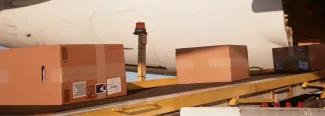China Struggling to Get Supplies Shipped
A recent video from Al Jazeera shows stacks and stacks of medical supplies in China that are waiting to be shipped. There are several issues causing problems shipping them out.
The first is the ocean- and air freight capacity. While both ocean and air are both recovering, the capacity is still not what it should be.
The second is the volume of goods waiting to be shipped. Next to the vast amounts of medical supplies, there is also a huge backlog in industrial parts and consumer goods, which have been stacking up since the lockdown of China in January.
The third is increased checks by Chinese customs. Export rules for medical supplies have been tightened, after international pressure. There were too many shipments with sub-standard equipment coming out of China.
Al Jazeera further reports:
"They impose almost on a daily basis new criteria that exporters need to adhere to, so you are constantly faced with shifting goalposts. You're just about to load your stuff on the plane then bang - a brand new mandate comes out from the Chinese government…”
…
The Chinese government told Al Jazeera, "COVID-19 test kits, face masks, protective gowns, ventilators and infrared thermometers are allowed for export as long as they are compliant with either Chinese or US Food and Drug Administration quality standards."
The situation is so serious that earlier this month the US State Department asked China to ease their new quality control rules to help break the logjam of goods piling up at export hubs.
As the price of masks and medical clothing spirals so has the cost of air freight, which this procurement specialist said had increased 12-fold since the start of the pandemic.
Freight Lanes Open for Medical Supplies in Europe
The EU has limited the export of medical supplies as there is a risk of shortages within the EU. At the same time, it has introduced fast-track lanes to make sure medical supplies move fast within the European Union.
To cope with the supply issues, the EU has introduced fast-track lanes – priority channels for the transport of much-needed goods, including medicines. For freight transport going through these lanes, border crossings should be accessible 24/7 and, according to the EU guidelines, border processing time should take no more than 15 minutes.
…
According to the EU guidance, any required checks and screening should be completed without drivers having to leave their vehicles and they should not be requested to provide any documents except for identification, driving license, and a letter from the employer. Under this scheme the electronic submission documentation is not accepted.
Customs Support: Empowering Global Trade
If you have questions about importing or exporting medical supplies or other goods, contact one of our experts. They are happy to help.














